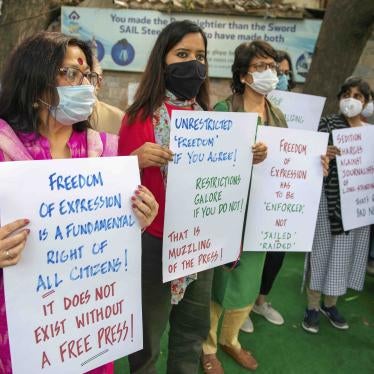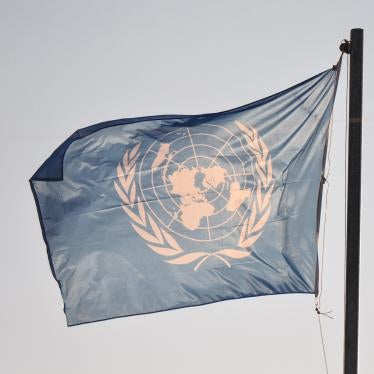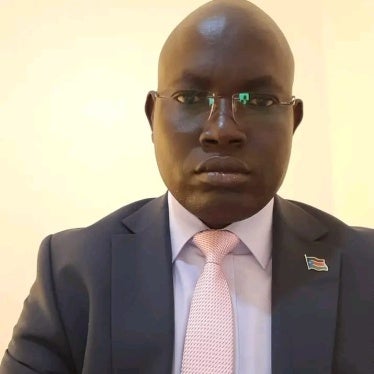Summary
Ongoing human rights concerns in Pakistan include arbitrary detention (including of lawyers and human rights defenders); lack of fair trials; mistreatment, torture and enforced disappearances of terrorism suspects and political opponents; harassment, intimidation and censorship of the media; violence against women; and discrimination against religious minorities. Since November 2007, the Government has severely interfered with democratic institutions and dissolved the independent judiciary. This submission will focus on four core areas where Human Rights Watch has conducted extensive research.
1. Independence of the judiciary and constitutional amendments
On November 3, 2007, Musharraf suspended Pakistan’s constitution, fired two thirds of the country’s senior judiciary and arrested thousands of opponents, most of whom were eventually released because of international pressure. As of February 8, 2008, the fired Chief Justice of the Supreme Court, Iftikhar Mohammad Chaudhry, five judges and several leading lawyers, remain under house arrest.
President Musharraf, in his capacity as army chief, used the state of emergency as an excuse to amend the constitution and several laws. These constitutional amendments seek to institutionalize serious restrictions on individual rights, provide immunity for Musharraf and other officials for human rights violations and subvert the rule of law- since they remain in place even after the state of emergency is lifted and constitutional rule is restored.
The executive order to amend the constitution passed on November 21, 2007.1, gives blanket indemnity for all actions taken during the period the constitution was suspended. The order includes a number of amendments that would normally require a two-thirds majority in parliament to become law. Critically this act withdrew the power of judicial review by Pakistan’s courts of all actions taken since November 3, 2007. The key institution to arbiter violations of human rights by State actors has been crippled.
An amendment to the 1952 Army Act gives the military power to try civilians in special military courts for a wide range of offenses previously under the purview of the country’s judiciary including charges as vague as causing “public mischief”. These military courts are closed to the public, the investigations are conducted by military officers, and without the standard rules of evidence and procedures for criminal trials. The law takes effect retrospectively from January 2003, in effect sanctioning impunity to the army for detaining and “disappearing” people and allowing the military to detain opponents.
An amendment to the 1973 Legal Practitioners and Bar Councils Act ends the independence of the Bar Associations and gives the government new powers to disbar lawyers involved in anti-government activities. It also empowers the Supreme Court or the High Courts, now weak political appointees under Musharraf’s control, to disbar lawyers. Two other decrees introduced by Musharraf deal with the media and are considered below under freedom of expression.
2. Freedom of expression
Freedom of expression and information is under persistent pressure by the Pakistan government. Security forces have physically attacked media offices and are known to torture, kidnap, illegally detain, beat and coerce reporters working for local, regional, national, and international media.
Human Rights Watch documented various attacks on the media throughout 2007 such as:
- On March 16 2007, riot police attacked the Islamabad offices of the Jang Group, housing the newspapers Jang and The News, and Geo TV. The police broke into the offices, damaged property and terrorized journalists while media personnel attempted to cover an anti-government protest underway outside.
- On May 12, 2007, while covering a rally to welcome the chief justice to Karachi, a private television channel, Aaj TV, broadcast live footage of armed Muttahida Quami Movement (MQM).2 activists roaming outside its offices. Angered by the telecast, MQM activists fired shots at the Aaj TV office and damaged more than a dozen vehicles in the station’s parking lot.
- In May 2007, the Mohajir Rabita Council (MRC), an affiliate of the MQM, issued a statement naming 12 eminent Pakistani journalists as “enemies.” On May 29, journalists working for the Associated Press (AP) and the Agence France-Presse (AFP) wire services, found identical envelopes containing a 30mm bullet, planted in their cars. Two of these journalists had been named in the MRC statement. The MQM has a long record of political harassment, extortion, torture and targeted killings and Musharraf’s failure to take action against the MQM suggested that he condoned the MQM’s behavior.
- On September 29, 2007, dozens of journalists were seriously injured in police violence as they attempted to cover anti-Musharraf protests by lawyers in Islamabad and Peshawar.
Several privately-run TV channels, including Aaj TV, ARY and Geo TV, reported their transmissions being taken off air by cable operators because they were transmitting footage of violence by state authorities. Since the November imposition of martial law, private and international television stations have been removed from the air, with some journalists detained and some international journalists expelled.
No security forces have been brought to justice for any of these attacks on journalists. Several low-ranking policemen were suspended for attacking the Geo office in Islamabad in March 2007, and although it is highly unlikely they could have acted without orders from higher authorities, no one responsible has been brought to book for the attack. The government routinely blames the media for projecting violence, suggesting that their “lack of responsibility” justifies such attacks.
The media has been muzzled further through two decrees passed in November 2007 barring it from printing or broadcasting “anything which defames or brings into ridicule the head of state, or members of the armed forces, or executive, legislative or judicial organ of the state.” Television discussions on anything which is deemed to be “false or baseless” by the regulatory authorities have also been banned.
Private Pakistani television networks were instructed to sign or abide by a new 14-page code of conduct by the Pakistan Electronic Media Regulatory Authority (PEMRA). Geo TV, the country’s largest private television was off the air in Pakistan for 77 days. The current restrictions prohibit live coverage of events and hold talk show hosts and anchors responsible for anything their guests or interviewees might say. Journalists have been repeatedly threatened and prevented from fully covering events following suspension of the constitution, had their equipment confiscated, and warned that if they record footage of arrests or police raids, they themselves will face arrest and incarceration.
Officials of the Pakistan government insist that there is no censorship and that the media is free. The official response to criticism of these curbs is that they are necessary to prevent the media from becoming a tool in the hands of enemies of the federation of Pakistan, who are trying to make President Musharraf controversial as the president is the symbol of the federation and unites the federating units.
3. Enforced disappearances and other abuses in the “war on terror”
Counterterrorism operations in Pakistan continue to be conducted on a widespread scale, often illegally and equally often with serious violations of human rights. Suspects held on terrorism charges frequently are detained without charge or tried without proper judicial process. Human Rights Watch has documented scores of illegal detentions, instances of torture, and “disappearances” in Pakistan’s major cities. Counterterrorism laws also continue to be misused to perpetuate vendettas as an instrument of political coercion.
Though Pakistani authorities have presented figures suggesting that more than 1,000 terrorism suspects have been arrested since 2001, only a small fraction of such cases have passed through the legal system. The secrecy around counterterrorism operations makes it impossible to ascertain exactly how many have “disappeared”. Some of the 600 cases of “disappearances” being investigated by the Supreme Court were related to the “war on terror”. Prior to the emergency and the dismissal of judges who refused to take oath under Musharraf’s emergency orders, the Supreme Court maintained pressure on the government, publicly stating that it had overwhelming evidence that Pakistan’s intelligence agencies were detaining terror suspects and other opponents and repeatedly urging throughout 2007 that the authorities should free such individuals or process them through the legal system. In response to pressure from the Supreme Court, scores of those who “disappeared” were freed or charged, and some foreign or dual citizens have been deported to their countries of origin. Torture and ill-treatment of individuals remaining in custody remains a serious concern.
4. Violence against women
Violence against women and girls, including domestic violence, rape, “honor killings,” acid attacks, and forced marriages, remain serious problems in Pakistan. Precise figures on gender-based violence are difficult to obtain, but estimates range from 50-90 percent of women experiencing some form of violence. Survivors of violence encounter unresponsiveness and hostility at each level of the criminal justice system, from police who fail to register or investigate cases of gender-based violence to judges with little training or commitment to women’s equal rights. According to Pakistan's Interior Ministry, there have been more than 4,100 “honor killings” since 2001. However, provisions of the Qisas and Diyat law which allow the next of kin to “forgive” the murderer in exchange for monetary compensation remain in force, and continue to be used by offenders to escape punishment in cases of so-called honor killings. Such laws which in effect allow men to pay to kill women act as no deterrent to those who would engage in so-called honor killings.
Pakistan has no specific domestic violence legislation and has failed to repeal the repressive Hudood Ordinances. This set of laws, enacted in 1979, has led to thousands of women being imprisoned for so-called “honor” crimes and has rendered most sexual assault victims unable to seek redress through the criminal justice system, deeming them guilty of illegal sex rather than victims of unlawful violence or abuse. The Women’s Protection Act, adopted in December 2006, brings rape under the Pakistan Penal Code. This eliminates the previous requirement for four male witnesses to validate a woman’s claim to being raped, and allows convictions to be made on the basis of forensic and circumstantial evidence. Despite its positive provisions, the Women’s Protection Act fails to comply with many of Pakistan’s obligations under the Convention on the Elimination of Discrimination Against Women. The amendments do not address fundamental problems with the Hudood Ordinance, such as the discriminatory provisions that criminalize non-marital consensual sex and fail to recognize marital rape.
Recommendations
Regarding independence of the judiciary and constitutional amendments, the Pakistan government should:
- Repeal all arbitrary laws and constitutional amendments in effect since November 3, 2007, and restore the Constitution in its entirety as it stood on November 3, 2007.
- Release and reinstate Chief Justice Iftikhar Mohammad Chaudhry and all other judges who have refused to take oath under the November 3 Provisional Constitution Order.
- Release all arbitrarily detained lawyers, political activists and opponents of the government. Provide prompt and appropriate redress to those arbitrarily detained.
- Withdraw all cases filed under the Anti-Terrorism Act, the sedition law or other sundry provisions of the law for acts protected under international human rights law or are otherwise not cognizable criminal offenses.
- End efforts to coerce or intimidate judges and lawyers from exercising their legal functions and the rights to freedom of expression and assembly.
Regarding freedom of expression, the Pakistan government should:
- Immediately lift all restrictions and decrees imposed on the country’s broadcast media.
- End the harassment, intimidation, use of coercion, violence and other abuses against media personnel.
- Investigate and prosecute any government officials perpetrating abuses against members of the media.
- Withdraw the PEMRA code-of-conduct as an instrument of censorship and coercion.
Regarding enforced disappearances, the Pakistan government should:
- Make known the names and whereabouts of detainees.
- Provide immediate access by the International Committee of the Red Cross (ICRC) to all detainees the organization seeks to visit.
- Charge detainees with a recognizable criminal offense and promptly bring them to trial before a court that meets international fair trial standards or release them; and
- Allow detainees access to lawyers and to communicate with family members.
Regarding violence against women, the Pakistan government should:
- Decriminalize adultery and non-marital consensual sex and adopt rules of evidence that give equal weight to testimony given by men and women.
- Prohibit in all circumstances the use of the provisions of the Qisas and Diyat law which allow the next of kin to “forgive” the murderer in a so-called “honor killing”.
- Raise public awareness about the laws and better train police to deal with victims of sexual assault and improve support services such as shelters and burn units for women.
1Constitution (Amendment) Order, 2007 (President’s Order No. 5 of 2007).
2MQM is a major coalition partner in Musharraf’s government.








